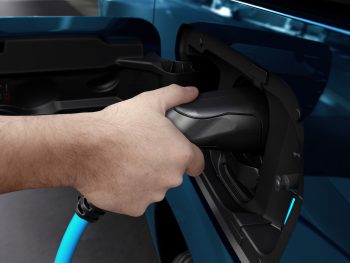Fleet car registrations drop 27.6% but EV take-up rises 14.6%
UK new car registrations fell 24.3% last month, putting in their weakest June performance since 1996 as the supply shortages continued to “shackle” the market.

Battery electric vehicles (BEVs) continued their growth streak, with a 14.6% increase in volume, as market share continued to grow
New figures from the Society of Motor Manufacturers and Traders (SMMT) show 140,958 new cars were registered last month – down by over 45,000 units compared to June 2021, which was itself hit by the pandemic and was down by 16% on the 10-year June average.
New car registrations to larger fleets fell more than a quarter (27.6%) while ‘Business’ registrations to companies with fewer than 25 vehicles dropped 5.3%. Private consumer volumes also dropped, but by a more modest 21.7%. As a result, the fleet and business share of the market reduced to 50.7% as manufacturers continue to prioritise private consumers amid the supply-constrained environment – causing increased challenges for fleets, according to the AFP today.
The year-to-date registration figures lay bare how the ongoing challenges in component supply are hampering the industry. For the first six months of the year, 802,079 units were registered – a fall of 11.9% on last year and the second weakest first half for 30 years. The downturn equates to some 107,894 fewer new cars compared to the first half last year – and that’s despite dealership lockdowns having been in lockdown from January to April 2021, with consumers only able to buy vehicles through click and collect. Registrations by larger fleets were down 26.4% while smaller fleets were up by 8.8% and private registrations grew 4.2%.
Battery electric vehicles (BEVs) remained the one bright spot with a 14.6% increase in volume last month to 22,737 units. As a result, their market share continued to grow, reaching 16.1%, up from 10.7% a year before. But plug-in hybrids (PHEVS) continued to fall, down by 36.5% or 4,425 units to take a 5.5% market share. In total, plug-in vehicles comprised more than a fifth (21.6%) of new cars joining the road in the month. Hybrids fell 7.3%, with some 1,172 units fewer registered, but increased their market share to 10.6% from 8.7% a year ago.
And for the year to date, BEVs were up 56.0%, taking a 14.4% market share while PHEVs dropped 11.9% but retained the same 6.4% market share. As a result, plug-ins accounted for a record one in five (20.8%) new car registrations year to date.
However, the SMMT noted that the pace of plug-in vehicle growth is decelerating, with registrations up by 26.0% in the first half of 2022, compared with growth of 161.3% during the first half of 2021. While growth rates were expected to slow down as the market begins to establish, the SMMT said the slowdown was more than had been anticipated, leaving the market behind the industry’s outlook. It also said last month’s scrappage of the Plug-in Car Grant means the UK is now the only major European market without purchase incentives for private EV buyers.
Such a slowdown in growth has huge implications for fleet renewal and the UK’s ability to meet overall carbon reduction targets, the SMMT warned.
But Mike Hawes, SMMT chief executive, added: “With motorists facing rising fuel costs, however, the switch to an electric car makes ever more sense and the industry is working hard to improve supply and prioritise deliveries of these new technologies given the savings they can afford drivers.”
The UK’s leasing sector also said it was working to provide drivers with access to such EV savings, in particular through salary sacrifice.
Jon Lawes, managing director, Novuna Vehicle Solutions, commented: “As eye-watering prices at the pumps prevail, there has never been a better time to lease an EV, particularly via generous salary sacrifice schemes where we’re seeing a huge demand from customers seeking to help their employees join the EV revolution. Leasing not only offers a cost-effective way to get into an EV, but it also provides protection of fixed costs against the challenging backdrop of rising inflation.”
And Lex Autolease called for continued use of incentives to further drive EV take-up on the back of the 56% rise year-to-date.
Meryem Brassington, electrification propositions lead, outlined: “In order to continue this momentum, we must guarantee that EVs are affordable for all through a stable second-hand market while ensuring the UK’s public charging infrastructure is robust enough to match the increased number of electric vehicles on the roads. The Government’s decision to redirect investment away from the Plug-in Car Grant towards accelerating the roll-out of charge points will go some way to help meet the demand, but we must continue to see further investment from policy makers.
“This includes a long-term visibility of company car rates beyond 2025 to give fleet decision-makers the clarity they need to make purchasing decisions, especially with the longer lead times from manufacturers currently being experienced.”
Deloitte also stressed there should be no let-up in incentives.
Jamie Hamilton, automotive partner and head of electric vehicles, emphasised: “As the market for electric vehicles continue to grow, attention must turn to the continued rollout of charging infrastructure, as well as the longer-term view on production infrastructure in the UK. This will involve further investment in gigafactories and the associated supply chain to ensure the UK can remain competitive on the global stage.”












